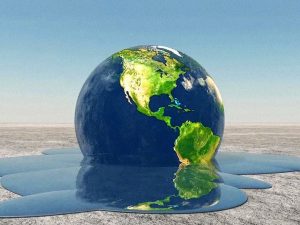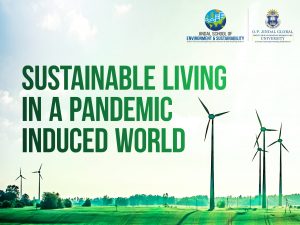An unusual bout of heavy rains and freak hailstorm hit New Delhi just two days after an international conference on ‘Environment & Sustainability: Critical Issues & Solutions’ organised by O.P. Jindal Global University (JGU) and World Wide Fund for Nature (WWF) at India Habitat Centre, earlier this year. It was the middle of March. When the days ought to be getting warmer, the reality of our rapidly changing climate came ‘hailing’ down on us.
Whichever part of the world you are in, these unusual conditions are becoming a bit too usual. Climate change and the environmental crisis has far-reaching consequences across the planet. From erratic rainfall patterns to rising temperatures, storms to melting glaciers, pollution to soil erosion, deforestation to species extinction, and so much more—the effects are growing harsher by the day.
In fact, the conference, held on 12th March, was almost called off because of another looming crisis. Covid-19 was on the brink of a global outbreak. It was just a matter of days before the nationwide lockdown was announced in India, and cases started skyrocketing across the world. It was a surreal time. It still is, as the pandemic continues to disrupt lives and livelihoods the world over. To think that a group of environmentalists, lawyers, judges, policy makers, ministers, economists, academicians and students met on the threshold of an unprecedented disaster to discuss issues of the environment and sustainability was indeed extraordinary!
It is in the quest for solutions towards a sustainable future that O.P. Jindal Global University announced the launch of its ninth and new school—Jindal School of Environment & Sustainability (JSES)—on that fateful day of the conference. Just before the hailstorm hit New Delhi, and just before the whole world was engulfed in an epic catastrophe. The coronavirus pandemic, the lockdown and its intriguing effects on pollution, rivers and wildlife have underlined the need to have a fresh look at the climate change and environmental crisis, adding a heavy burden on the academic world to address the issues through strong environmental studies programmes.
Here’s a look at some of the major environmental challenges of 2020 that call for immediate attention.
Climate Change
At the conference, visiting India for the first time, was Justice Matthew F. Cooper of the New York County Supreme Court. In New Delhi, he saw a reflection of his home, New York City—the problems, the population, even the landscape, with big green spaces like the Central Park comparable to the Lodhi Gardens, as he describes. “Growing up, there was one thing we were always comfortable with—NYC doesn’t get storms. In 2011, came Hurricane Irene, touted as the ‘storm of the century’. Surely this meant that it shouldn’t happen again in the next 100 years. But then came SuperStorm Sandy in 2012, and New York was brought to a halt,” recounts Justice Cooper. New York to New Delhi, environmental issues are becoming more glaring across the world. The higher education landscape across the world has to vamp up courses on environmental studies to produce skilled, knowledgeable persons to deal with the rising crises.
The climate predictions for the future are alarming. Entire cities may be submerged causing staggering tolls on economies that could lead to a full-blown humanitarian crisis with millions displaced from their homes; greenhouse gas emissions are continuing to rise and the oceans and lands are heating up like never before.
Everyone remembers the landmark Paris Agreement of 2015. It saw the largest group of nations coming together in a bid to keep rising temperatures below two degrees Celsius. Five years later, the progress is not reassuring. Not only is the ambitious goal going to fall through, but we can expect a rise of three degrees—if we don’t act fast.
Loss of biodiversity, deforestation & threat to wildlife
Bushfires of never-before-seen proportions blazed through Australia from late 2019 to early 2020. Studies show that the fires claimed the lives of over one billion mammals, birds and reptiles. Protestors hit the streets speaking out against fossil fuels, as the fires were linked to climate change. Such rallies for the environment are growing more common across the world, as concerns continue to rise and action falls short.
On the opposite side of the planet, massive deforestation of the Amazon rainforest has been underway. As the ‘lungs of the planet’ take a severe blow, we are losing the ‘rainforests of the sea’, the coral reefs; global warming is melting polar ice-caps; wildlife and habitats are dying out or under extreme threat of extinction; and the loss of forests, which act as natural ‘carbon sinks’ that absorb carbon and keep it from spilling into the atmosphere or water bodies, are aggravating pollution. Which brings us to the next point of concern.
Pollution
Be it air, water or land, pollution levels are rapidly rising. Interestingly, the Covid-19 pandemic brought some relief, and perhaps gives a head-start to leverage immediate climate action, but other than that, the global scenario has been bleak. Though only a handful of countries are successfully implementing steps towards being ‘carbon-negative’, most are not. With an overload of carbon in the atmosphere, the air is becoming hazardous in many parts of the world, even taking millions of lives. Burning of fossil fuels, industrial activities, waste, erosion, acid rain, etc. are stacking up the pollution charts.
Growing population & urban sprawl
According to a United Nations report, human population is estimated to grow to a whopping 9.8 billion by the year 2050. The repercussions are almost unfathomable. The pressure of rising populations affects the use and exploitation of already dwindling natural resources like water, food and fuels. The needs will become unsustainable in the times to come, without alternative sources of energy or curbing population growth. This issue also links to the problem of urban sprawl—with movement of populations from high-density cities to more rural settings, which brings its own set of environmental concerns from further pollution to deforestation.
Business
Climate litigation is coming up in many countries with lawyers and laypeople challenging governments and corporations with climate change lawsuits. Businesses are a major source of environmental concerns, which raises an urgent need for green practices and sustainability. The fact of the matter is, development cannot be ceased. But at what cost does it come? There is a need to seriously overhaul many global practices and phenomena and pave the way towards a sustainable future. Top universities in India and across the world are being called on to offer serious training to bridge the gap.
JSES aims to work on holistic solutions for the 21st century
It is the heat of these burning environmental issues that led to the establishment of Jindal School of Environment & Sustainability. Its flagship programme, the three-year multidisciplinary B.A. (Hons.) in Environmental Studies is a way for young students passionate about the environment to jump right into dedicated training. O.P. Jindal Global University is a popular choice among today’s students across disciplines as its interdisciplinary, global approach has earned the young university a rank among the best. The recent QS World University Rankings 2021 named JGU the best private university in India.
The environmental studies programme at JGU gives a well-rounded perspective, much needed for conceptualising and implementing integrated solutions. Dealing with issues of the environment are right up on the list of priorities as politics or economy. In fact, they must work in tandem. So, the environmental studies programme will develop an understanding of the economic, cultural and political factors of environmental and sustainability issues.
The voices of people fighting climate and environmental crises have been fierce yet few. Even though more people are making the case for climate action, with young leaders like Greta Thunberg and Timoci Naulusala to long-time activists Jane Goodall, Bill McKibben or Sunita Narain, and influential icons like Bill Gates, the world needs a lot more hands on deck. Lawyers to activists, researchers to conservationists, policy makers to economists—there is a need for more and more people to step up and contribute to the rising challenges.
Covid-19, a wake-up call?
Though a lot of controversy surrounds the origins of Covid-19, a major argument is that it has its roots in illegal wildlife trade. Something that perhaps only a small group of environmentalists and activists have been sounding out for a long time has now become the talk of every household.
In a way, the pandemic has been a wake-up call for the world. In a push-comes-to-shove kind of situation, we have been forced to reckon with the backlash of the problems humanity has spawned. Change of the magnitude that is needed to ‘save the world’ at this point needs the commitment of one and all! Will we, as a civilisation, wake up, and listen? Will we act?
We will remember this time for the rest of our lives. How we choose to move forward from this is critical. It’s time to bring the winds of change; it’s time to be the change. JSES is a platform for young people to battle the myriad environmental issues that plague the world.
In the days since Covid-19, we caught a glimpse of a cleaner, greener world. We have to learn and grow from this disaster. We must seize the opportunity and take big strides for the environment. A holistic training in environmental studies is a way for young generations to be a part of the solution to fix the planet we call home.


